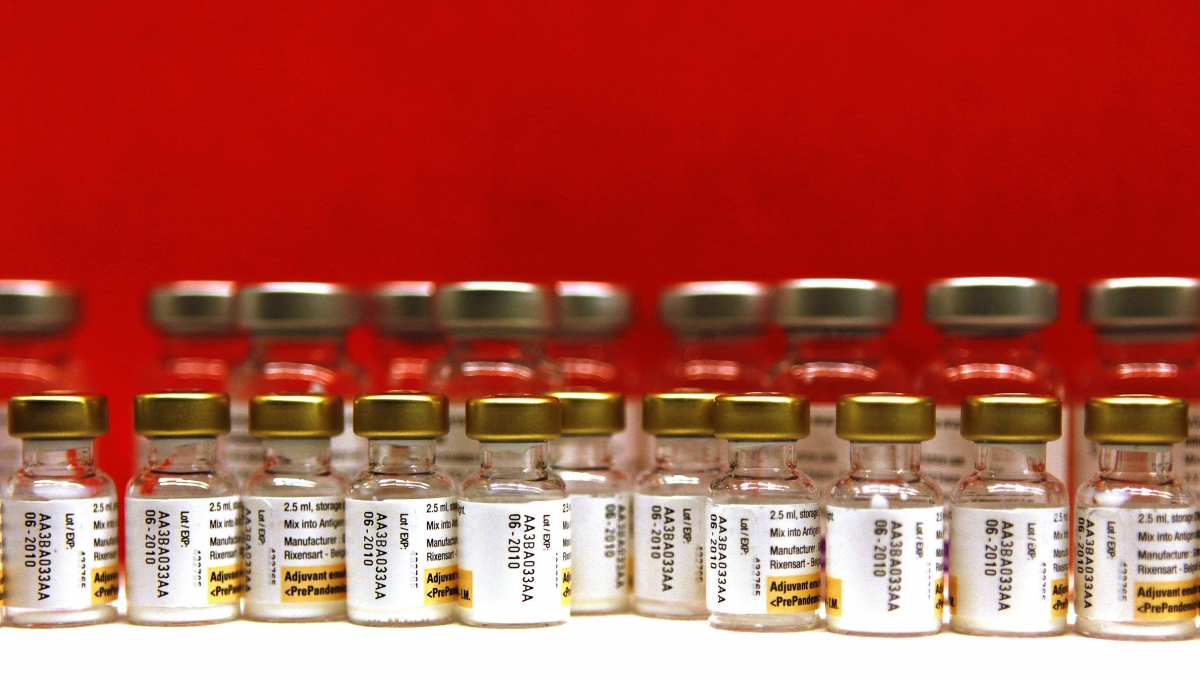Brain-Damaged UK Victims of Swine Flu Vaccine to Get £60 Million Compensation

Bottles of Pandemrix, used as a vaccination against swine flu, now banned for those under 20.
Patients who suffered brain damage as a result of taking a swine flu vaccine are to receive multi-million-pound payouts from the UK government.
The government is expected to receive a bill of approximately £60 million, with each of the 60 victims expected to receive about £1 million each.
Peter Todd, a lawyer who represented many of the claimants, told the Sunday Times: "There has never been a case like this before. The victims of this vaccine have an incurable and lifelong condition and will require extensive medication."
Following the swine flu outbreak of 2009, about 60 million people, most of them children, received the vaccine.
It was subsequently revealed that the vaccine, Pandemrix, can cause narcolepsy and cataplexy in about one in 16,000 people, and many more are expected to come forward with the symptoms.
Across Europe, more than 800 children are so far known to have been made ill by the vaccine.
Video Shows How Deadly Virus Would Spread Globally
Narcolepsy affects a person's sleeping cycle, leaving them unable to sleep for more than 90 minutes at a time, and causing them to fall unconscious during the day. The condition damages mental function and memory, and can lead to hallucinations and mental illness.
Cataplexy causes a person to lose consciousness when they are experiencing heightened emotion, including when they are laughing.
The Pandemrix vaccine was manufactured by pharmaceuticals giant Glaxo Smith Kline, which refused to supply governments unless it was indemnified against any claim for damage caused. The company will pay the bill, and claim the money back from the government.
"There's no doubt in my mind whatsoever that Pandemrix increased the occurrence of narcolepsy onset in children in some countries - and probably in most countries," Emmanuelle Mignot, a specialist in sleep disorder at Stanford University in the United States told Reuters.
Mignot has been paid by GSK to research the effects of the drug.
Among those affected are NHS medical staff, many of whom are now unable to do their jobs because of the symptoms brought on by the vaccine. They will be suing the government for millions in lost earnings.
However, the vast majority of patients affected - around 80% - are children.
Among them is Josh Hadfield, 8, from Somerset, who is on anti-narcolepsy drugs costing £15,000 a year to help him stay awake during the school day.
"If you make him laugh, he collapses. His memory is shot. There is no cure. He says he wishes he hadn't been born. I feel incredibly guilty about letting him have the vaccine," said his mother Caroline Hadfield, 43.
Despite a 2011 warning from the European Medicines Agency against using the vaccine on those under 20 and a study indicating a 13-fold heightened risk of narcolepsy in vaccinated children, GSK has refused to acknowledge a link.
"Further research is needed to confirm what role the vaccine may have played in the development of narcolepsy in those affected," the company said in a statement.
@LeyeT @newworldafro @Ill Clinton @Kritic @Tuaminator @Marvel
-

By Tom PorterMarch 2, 2014 14:40 GMT

Bottles of Pandemrix, used as a vaccination against swine flu, now banned for those under 20.
Patients who suffered brain damage as a result of taking a swine flu vaccine are to receive multi-million-pound payouts from the UK government.
The government is expected to receive a bill of approximately £60 million, with each of the 60 victims expected to receive about £1 million each.
Peter Todd, a lawyer who represented many of the claimants, told the Sunday Times: "There has never been a case like this before. The victims of this vaccine have an incurable and lifelong condition and will require extensive medication."
Following the swine flu outbreak of 2009, about 60 million people, most of them children, received the vaccine.
It was subsequently revealed that the vaccine, Pandemrix, can cause narcolepsy and cataplexy in about one in 16,000 people, and many more are expected to come forward with the symptoms.
Across Europe, more than 800 children are so far known to have been made ill by the vaccine.
Video Shows How Deadly Virus Would Spread Globally
Narcolepsy affects a person's sleeping cycle, leaving them unable to sleep for more than 90 minutes at a time, and causing them to fall unconscious during the day. The condition damages mental function and memory, and can lead to hallucinations and mental illness.
Cataplexy causes a person to lose consciousness when they are experiencing heightened emotion, including when they are laughing.
The Pandemrix vaccine was manufactured by pharmaceuticals giant Glaxo Smith Kline, which refused to supply governments unless it was indemnified against any claim for damage caused. The company will pay the bill, and claim the money back from the government.
"There's no doubt in my mind whatsoever that Pandemrix increased the occurrence of narcolepsy onset in children in some countries - and probably in most countries," Emmanuelle Mignot, a specialist in sleep disorder at Stanford University in the United States told Reuters.
Mignot has been paid by GSK to research the effects of the drug.
Among those affected are NHS medical staff, many of whom are now unable to do their jobs because of the symptoms brought on by the vaccine. They will be suing the government for millions in lost earnings.
However, the vast majority of patients affected - around 80% - are children.
Among them is Josh Hadfield, 8, from Somerset, who is on anti-narcolepsy drugs costing £15,000 a year to help him stay awake during the school day.
"If you make him laugh, he collapses. His memory is shot. There is no cure. He says he wishes he hadn't been born. I feel incredibly guilty about letting him have the vaccine," said his mother Caroline Hadfield, 43.
Despite a 2011 warning from the European Medicines Agency against using the vaccine on those under 20 and a study indicating a 13-fold heightened risk of narcolepsy in vaccinated children, GSK has refused to acknowledge a link.
"Further research is needed to confirm what role the vaccine may have played in the development of narcolepsy in those affected," the company said in a statement.
@LeyeT @newworldafro @Ill Clinton @Kritic @Tuaminator @Marvel

